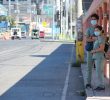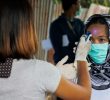CAGAYAN DE ORO CITY – Amid the lack of safety data in the majority of studies according to the manufacturer of Ivermectin who does not recommend its use for COVID-19 treatment, a group of doctors insists on the use of it as prophylaxis and treatment of the virulent disease.
In April this year, Merck, the maker of Ivermectin, announced that in its analysis there is no scientific basis for the drug to be used for COVID-19 treatment as it does not provide relevant evidence to be effective and safe for therapeutic use.
But, a group of doctors and researchers believed otherwise claiming the drug can help combat the deadly virus.
According to the Concerned Doctors and Citizens of the Philippines (CDCPH) in a statement, “the most current global meta-study of Ivermectin shows its effectiveness in preventing hospitalizations and curbing deaths among those infected with [Covid-19].”
CDCPH is a non-profit, non-partisan organization composed of medical practitioners, business professionals, and civic-minded citizens advocating for science-based, cost-effective treatments to save lives and livelihoods during this pandemic.
The World Health Organization (WHO) does not recommend its use to COVID-19 patients; the Department of Health (DOH) and the Food and Drug Administration (FDA) have advised the public against using Ivermectin to treat Covid-19.
In a recent joint statement, DOH and FDA said they do not recommend the use of antiparasitic drug Ivermectin “due to insufficient scientific evidence” and that its benefits “has not been established.”
But Dr. Rafael Castillo, CDCPH member, said that as of July 10, 2021, global meta-analyses of a total 62 trials conducted by 585 scientists on 22, 425 patients have shown some promising results.
A meta-analysis is the examination of data from a number of independent studies of the same subject, in order to determine overall trends.
Castillo noted that based on the studies conducted, there was an 85 percent improvement among patients in 14 trials using the Ivermectin as prophylaxis.
Prophylaxis refers to action taken to prevent disease, especially by specified means or against a specified disease.
Castillo has also noted the following results of the studies: a 74 percent improvement of 26 early treatment trials; a 46 percent improvement in 22 late treatment trials; a 69 percent improvement in curbing mortality; and a 62 percent improvement among patients with various stages of Covid-19 infections in 32 randomized controlled trials.
For his part, Dr. Benigno Agbayani Jr., another CDCPH member, explained that “if we are serious in mustering all the tools to fight this pandemic, we should look at the scientific data. In science, two of the gold standards for evidence are peer review and sample size.”
Peer-review refers to a process where a study’s data, methods, and analysis, and are freely accessible to experts in the field for verification and criticism, while a large sample size shows that the process and treatments have been applied to a sufficiently wide segment of people.
The global meta-analyses on Ivermectin, Agbayani said, “passes both standards because: First, the studies are all freely available for scrutiny at https://c19ivermectin.com; and second, because of the large sample sizes spanning a wide range of healthcare systems and patient characteristics from all over the world.”
Another CDCPH member, Dr. Allan Landrito, said: “The scientific evidence on Ivermectin as an effective prophylaxis and treatment for [Covid-19] is in line with both principles, and so we must make it widely available to everyone… now.”
Landrito was referring to the two tenets of the Hipporactic Oath that requires doctors to abide by the following: that they are morally bound to prevent disease, if possible, because prevention is better than cure; and to apply all measures required to nurse patients back to health.










